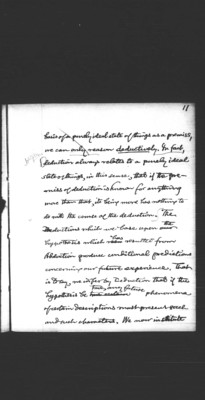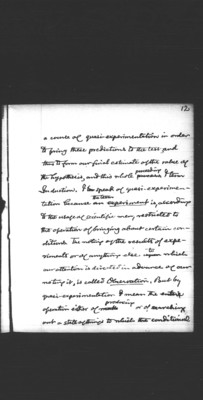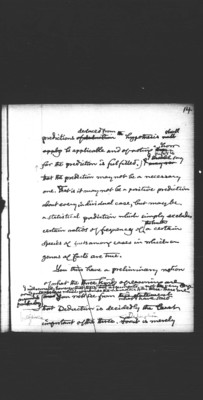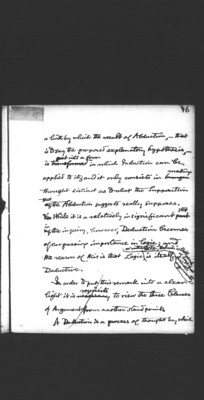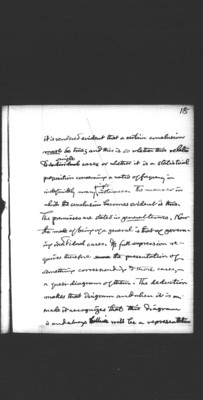Pages
6
11
basis of a purely ideal state of things as a premiss, we can only reason deductively. In fact, deduction always relates to a purely ideal state of things, in this sense, that if the premiss of deduction is known for anything more than that, its being more has nothing to do with the course of the deduction. The Deductions which we base upon the hypothesis which has resulted from Abduction produce conditional predictions concerning our future experience. That is to say, we infer by Deduction that if the hypothesis be true, any future phenomena of certain descriptions must present such and such characters. We now institute
7
12
a course of quasi-experimentation in order to bring these predictions to the test, and thus to form our final estimate of the value of the hypothesis, and this whole proceeding I term Induction. I speak of quasi-experimentation because the term experiment is, according to the usage of scientific men, restricted to the operation of bringing about certain conditions. The noting of the results of experiments or of anything else to which our attention is directed in advance of our noting it, is called Observation. But by quasi-experimentation I mean the entire operation either of producing or of searching out a state of things to which the conditional
8
14
predictions deduced from the hypothesis shall be applicable and of noting how far the prediction is fulfilled. I ought to say that the prediction may not be a necessary one. That is it may not be a positive prediction about every individual case, but may be a statistical prediction which simply excludes certain ratios of frequency of the truth a certain species of facts among cases in which a genus of facts are true.
You thus have a preliminary notion of what the three kinds of reasoning are. I will remark[?], however that there is a class of arguments, not a very large or important class which combines the characters of the three. These are arguments from Analogy.
You will see from what I have said that Deduction is decidedly the least important of the three. Deduction is merely
9
16
a link by which the result of Abduction,— that is to say the proposed explanatory hypothesis,— is put into a form in which Induction can be applied to it; and it only consists in making thought distinct as to what the Supposition that the Abduction suggests really supposes. While it is a relatively insignificant step in the inquiry, however, Deduction becomes of surpassing importance in logic; and the reason of this is that Logic or rather Critic, which is that branch of logic that evaluates arguments, is itself Deductive.
In order to put this remark into a clear light it is requisite to view the three Classes of Argument from another standpoint.
A Deduction is a process of thought by which
10
18
it is rendered evident that a certain conclusion must be true; and this is so whether this relates to individual single cases or whether it is a statistical proposition concerning a ratio of frequency in indefinitely many single instances. The manner in which the conclusion becomes evident is this. The premisses are stated in general terms. Now the mode of being of a general is that of governing individual cases. Its full expression requires therefore the presentation of something corresponding to those cases,— a quasi-diagram of them. The deduction makes that diagram and when it is made it recognizes that this diagram is and always will be a representation
